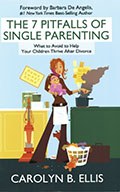
By Carolyn Ellis
Different homes may mean different parenting styles. Different rules about bedtimes, homework and household chores between mom’s house and dad’s house can make clashes and conflicts inevitable when co-parenting with your ex.
When you were married or living together, parents typically assume a “united front” in parenting to provide consistency and clarity for the children. Perhaps you had very different parenting styles when you were together. It may have been quite natural for you to facilitate the relationship your child has with the other parent. Now that you have “mom’s house” and “dad’s house”, the differences between how you and your ex relate to your children and parent them will be magnified.
No matter how much you try to be on the same page in terms of discipline, basic rules, chores, and activities, the differences in parenting styles will become quickly apparent. For the sake of your children, you must learn to distinguish what you have responsibility and control over and what you don’t.
Know when and where to pick your battles. You are responsible for the rules and code of conduct you have in your household. You are responsible for your thoughts, words, and actions. You may not like it, but you have no control or responsibility for the rules, code of conduct, and behavior of your ex-spouse.
“When we were together, we agreed that the children should not watch TV or play computer during the school week,” complained Laura. “Now it seems when they’re at their dad’s house, they do nothing but play video games and watch movies, even if there’s homework to do!” Laura admitted she would voice her frustration to her children by making sarcastic comments about her children’s father. She also increased her vigilance while the children were with her to make sure homework was completed. The result was more tension and conflict in her relationship with her children.
So what can you do when you find out that your ex has different rules, and you don’t necessarily agree with them? Clearly, if you learn that some potentially harmful behavior is going on in the other parent’s house, you must address it with your former spouse to keep your children safe. Examples here would include leaving underage children at home unsupervised, not using the proper safety devices in a car, or allowing the children to play with matches.
What can Laura, who is concerned about children not getting their homework done, do? If the children’s grades begin to slip, the teacher will likely express her concerns. Laura can share the feedback with her ex to encourage open co-parenting, and request that he ensure that the children do their homework while at his house. Laura can ask the teacher to give that feedback directly to the children’s father as well as to her.
One important lesson Laura can share with her children is they are responsible for getting their homework done, regardless of whether they are at her house or their dad’s house. If homework isn’t completed, the children will face consequences, such as staying in at recess or after school, serving detentions, and falling behind in their work. Instead of being sarcastic with her ex and taking on the mantle of a martyr, Laura can use these action steps to focus on the facts of the situation and create a more productive result.
The other parent will always be your child’s parent. Your child and former spouse will always have a relationship, and you need to respect that.








